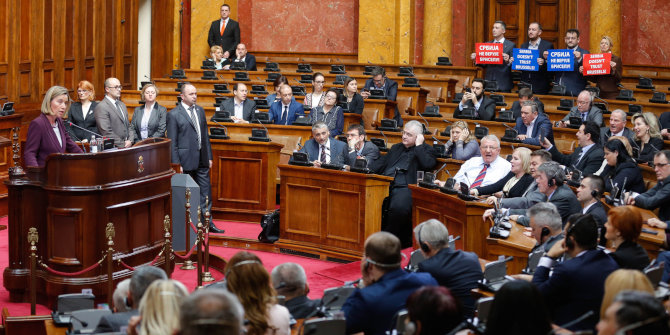 The Covid-19 pandemic is expected to create significant unemployment across Europe. Carlo Knotz writes that if past-crises are anything to go by, there is a high likelihood this could revive political debates about benefit fraud and disincentives to work. He argues that political scientists should aim to play a central role in these debates to explain the trade-offs that come with reforming benefit systems, and the dynamics and drivers of public concern about the unemployed.
The Covid-19 pandemic is expected to create significant unemployment across Europe. Carlo Knotz writes that if past-crises are anything to go by, there is a high likelihood this could revive political debates about benefit fraud and disincentives to work. He argues that political scientists should aim to play a central role in these debates to explain the trade-offs that come with reforming benefit systems, and the dynamics and drivers of public concern about the unemployed.
Concerns about benefit abuse among the unemployed are as old as unemployment benefit programmes themselves, and potentially even older. A considerable amount of political research suggests that these concerns are particularly likely to surface in the context of high unemployment rates and significant government budget deficits – the conditions currently being experienced in countries around the globe.
This means that the compassion toward the unemployed expressed in both public policy and public opinion since the imposition of economic lockdowns in response to the Covid-19 pandemic is likely to turn into resentment and emotionally charged debates about ‘malingerers’ or ‘cheats’ among the unemployed in the not too distant future. Others have recently suggested that this is likely to happen in the United States, but there is a good chance the same will happen on the other side of the Atlantic and elsewhere.
Specifically, the experiences of past economic crises and downturns tell us that two things are probably going to happen in the near future. First, questions about the functioning of unemployment benefit systems will be voiced. At best, these will take the form of concerns about disincentive effects; at worst, there will be expressions of anger and resentment at ‘lazy scroungers’ and ‘benefit cheats’. Second, policy reforms will be introduced in order to address these issues, taking the form of tougher benefit conditionality and in particular harsher benefit sanction rules.
A case in point is what happened in the United Kingdom in the aftermath of the 2008 financial crisis. In the context of a pronounced increase in unemployment and a substantial government budget deficit, leading politicians argued that idling and free-riding among the unemployed could no longer be tolerated and promised serious crackdowns on the ‘workshy’. These would eventually take the form of significantly harsher benefit sanction rules, which made it possible to exclude claimants from receiving benefits for up to three years.
Just a few years earlier, when Germany was ‘Europe’s sick man’ and similarly plagued by stubbornly high unemployment and repeated government deficits, politicians there saw ‘choosiness’ and ‘laziness’ among the unemployed as a major problem that needed to be addressed – then Chancellor Schröder famously stated that “there is no right to laziness in this society” – and this rhetoric would ultimately be the precursor to the Hartz reforms, one of the most sweeping unemployment benefit overhauls in German history. And, as a final example, one can also go back several decades and half-way around the globe to Australia in the 1970s. Following the economic shocks of the oil price crises, ‘dole bludgers’ emerged as a topic of public debate and successive governments then tightened benefit conditions and sanction rules.

Credit: Ben Terrett (CC BY-NC-ND 2.0)
The social and economic sciences can play an important role in these debates, in particular by clearly communicating the empirical record of the reforms that tend to follow: that there certainly is evidence that tougher job-search requirements and the imposition of sanctions can reduce unemployment – but also that these measures tend to have adverse side-effects such as long-term losses in job quality after unemployment. Very harsh sanction rules have a particularly mixed record in that they are not linked to gains in employment (the countries that traditionally have the toughest sanction rules are Greece, Spain, Italy, and Portugal while countries like Denmark and Austria are comparatively more lenient) but are instead associated with food hardship and mental health problems among the affected.
But there is also a role for political science, in particular, to explain the dynamics and drivers of public debates about the unemployed and unemployment benefit reforms – if only to hold up a mirror to society and to ensure in emotionally charged contexts that when reforms are introduced that affect the lives and livelihoods of large numbers of vulnerable people, the motives for doing so are clear to everyone.
And it is here where there is still room for more work. One aspect that is still to a large extent unclear is what really motivates supporters and opponents of tougher treatment of the unemployed. Some have suggested that the public is divided along socio-economic lines, with the better-off being supportive of harsher treatment of the unemployed and the less well-to-do being more opposed.
But there is also considerable evidence that resentment toward the unemployed and support for tough benefit conditionality is actually also driven by cultural value orientations, in particular a preference for order, conformity, and traditional moral values (‘authoritarianism’). And because authoritarianism is more pronounced among the less-educated, this would mean that tough benefit conditionality policies are strongly supported by a group that is quite likely to be adversely affected by them. There is of course no reason why members of the public should not be allowed to prioritise values over economics, but this choice should at a minimum be made explicit and clear. Public opinion research could provide the input for this.
A second still open question concerns the role of political parties. One might expect that parties on the left would for ideological reasons be less eager than parties on the right to chastise the unemployed in rhetoric and policy. In actuality, parties on both sides of the aisle have introduced tougher benefit conditionality rules. The sanction restrictions in the United Kingdom mentioned earlier were introduced by a Conservative government, whereas the Hartz reforms in Germany were introduced by a Social Democratic-Green government. And there are reasons to believe that parties’ actions in the area of unemployment benefits are really more motivated by electoral considerations than ideology. Again, this is not a problem in and of itself, but it should be made transparent. Political research can contribute here as well.
There is, of course, a chance that things will play out differently in this current crisis – after all, the pandemic is but one of the supposed ‘once-in-a-century’ events that have happened in recent years. Plus, political science has a notoriously poor record when it comes to predicting the future. But the political response to high unemployment has followed the playbook of past events, in the United Kingdom as mentioned but also in other countries like Ireland and New Zealand, after the last exceptional economic cataclysm in 2008. And, at least in the United States, concerns about the disincentive effects of too generous unemployment benefits were being raised already in March this year during the deliberations over the CARES Act. Hence, in all likelihood, this time won’t be different.
For more information, see the author’s recent paper at the Journal of European Public Policy
Please read our comments policy before commenting.
Note: This article gives the views of the author, not the position of EUROPP – European Politics and Policy or the London School of Economics.
_________________________________
 Carlo Knotz – University of Lausanne
Carlo Knotz – University of Lausanne
Carlo Knotz is a Postdoctoral Researcher at the Swiss Graduate School of Public Administration (IDHEAP) and a Postdoctoral Fellow at the NCCR – on the move, where he investigates the drivers of public opinion toward allowing immigrants access to social security systems. Previously, as a PhD Candidate at the University of Lund and as a Postdoctoral Fellow at the University of Bremen, he studied the politics and effects of “demanding” activation policies for unemployed workers. His work has been published in, inter alia, the European Sociological Review, Comparative Political Studies, and the Journal of Social Policy.





